Industry experts advocate multi-pronged strategy to make Indian roads safer
Webinar on ‘Towards A Safer India’ sees industry representatives call for a national movement to make roads safer, implement stricter norms to reduce accidents and save precious human life.
With over 146,000 fatalities due to road accidents and many four times that number injured or disabled every year, India continues to be the country with the worst accident record globally.
But not all is lost as some stakeholders of the automotive industry are making serious efforts at reducing these hoary statistics by employing life-saving equipment in vehicles, disseminating information to the people at large and also training drivers and riders. Still, there’s lots more to be done.
Autocar Professional’s webinar on ‘Towards A Safer India’, the second in its series, held today – the first day of UN Global Road Safety Week – saw a galaxy of top-notch industry speakers representing an OEM, two leading global component suppliers, India’s leading automotive research association, a global industry safety watchdog, and an NGO committed to improved road safety in India. The webinar, moderated by Autocar Professional’s associate editor Sumantra B Barooah, saw all the speakers arrive at a consensus that India needs to move fast on the safety front if lives are to be saved. After all, 16 lives are lost on Indian roads every hour!
Global NCAP pushes for latest safety tech in vehicles
Global NCAP, launched the Stop The Crash four-year campaign (with partners like Bosch, Continental, Autoliv, Thatcham Research, Denso, ZF-TRW, ADAC and Towards Zero Foundation), in support of the current UN Decade of Action for Road Safety to promote awareness of leading crash avoidance technologies in the major emerging automobile markets. The campaign highlights three key crash avoidance technologies – Electronic Stability Control, Autonomous Emergency Braking and Anti-Lock Brakes for motorcycles – with an overall objective to encourage governments to adopt relevant UN global standards so that the technologies eventually become a regulatory requirement for new vehicles.
GNCAP’s representative at today’s webinar was Alejandro Furas, technical director,who was forthright on the dire need to save human life. “All consumers in India deserve the same kind of protection as consumers get in Europe or in developed markets. The government should not wait for availability of safety technology in the country. Instead, it should go ahead and announce a date to which industry will have to adhere to. A crash test is not high cost when compared to saving human lives.”
He said that globally, prices of life-saving road safety technologies are falling sharply including that of autonomous emergency braking (AEB) systems. Citing an example, he said that the average cost of an airbag has fallen to US$ 50 levels and that India, along with China, will help drive down costs of various safety kit as a result of economies of scale that result from manufacturing. In fact, he went on to say that India has a good chance of manufacturing and exporting safety equipment. He urged vehicle manufacturers to harmonise with the UN’s vehicle safety parameters. Furas said, “I am sure India will react much faster than Latin American countries.In Latin America, the amount an insurance company pays for the loss of a human life is less than a car's cost!”
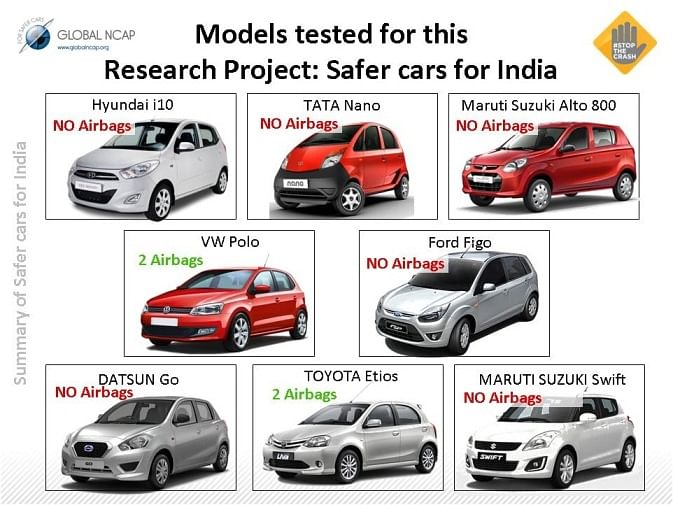
GNCAP has tested 8 Indian cars till now (Volkswagen Polo, Maruti Alto 800, Maruti Swift, Tata Nano, Hyundai i10, Ford Figo, Toyota Etios, and Datsun Go). The Polo and Etios, the sole cars to be equipped with two driver airbags, saw them receive 4-star ratings for frontal protection.
As is known, the Bajaj Qute quadricycle underwent a Euro NCAP test a few months ago. Commenting on the same, Furus said: “We were surprised to see Bajaj getting excited about the Qute’s 1-star safety rating.In fact, it needs to improve the Qute’s safety level and the company has the potential to get a five-star rating.”
Continental gears up to deliver safety products in India
In his comprehensive presentation, Raghav Gulur, head of Technical Center, Continental Automotive India, highlighted the existing road safety scenario in India. He said, “Two- and three-wheelers are the biggest victims of road accidents in India. The issue of motorcycle safety is much larger, with no formal motorcycle training, which is seriously an under-rated cause of accidents, especially for inexperienced, riders.”
He stated that 34 percent of road accident deaths involve two- and three-wheelers, followed by 17 percent of passenger vehicles and 13 percent heavy-duty trucks.
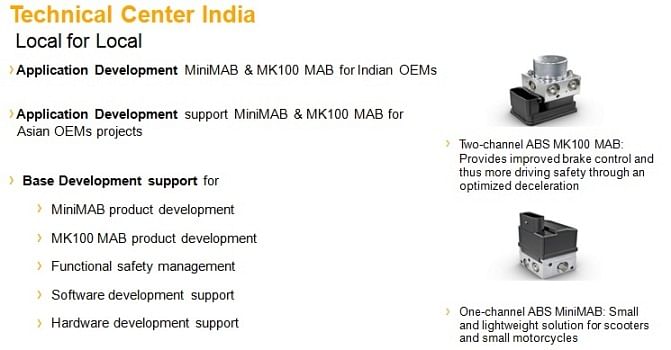
“India is lagging behind when it comes to application of safety technology. Electronic Stability Control (ESC) was first made mandatory for all new light vehicles in the USA in September 2008. In 2009, the European Union made Brake Assist (BA) compulsory. Even developing economies like Brazil opted for mandatory ABS of passenger vehicles in 2010,” said Gulur.
As a road safety initiative, Continental has launched its ‘Vision Zero’ campaign that aims to conquer the road fatalities. As per Gulur’s presentation, there are 200 European cities that have close to zero road fatalities. Continental is also partnering Global NCAP’s ‘Stop the Crash’ initiative with along with other automotive suppliers.
Continental is making speedy moves to deliver safety products in India. Earlier this year, the German supplier had announced that its Chassis & Safety Division will start production of ABS and ESC units in India later this year. A new assembly line for ABS and ESC for passenger cars and later ABS for two-wheelers will be set up in the existing Continental Automotive Brake Systems plant in Gurgaon, Haryana. The company targeting the delivery of its first localised ABS/ESC products for India to a leading vehicle manufacturer by the end of 2016.
Bosch shows how ABS and ESC can save lives
Kartikeya Joshi, marketing and sales head of Bosch Chassis Systems India, first spoke on how evolving active safety technologies and their legislation have delivered proven benefits in the European Union.
He then moved on to specific active safety technologies like ABS (Anti-lock Braking Systems), TCS (Traction Control System) and ESP (Electronic Stability Program). ABS can prevent one-quarter of all motorcycle accidents that result in casualties. The antilock braking system stops the wheels from locking up, which means the rider remains in control of the motorcycle while braking. This enables riders to react more quickly and without fear in a dangerous situation. TCS prevents spinning of the driven wheels during acceleration either by braking the spinning wheel and/or by reducing the drive torque. ESP prevents loss of control and accidents caused by skidding.
Fitment of ABS can substantially reduce the number of two-wheeler accidents in India. Bosch, which introduced the world’s first ABS in 1978 and TCS in 1986, is banking on increased usage of this critical safety equipment. According to Joshi, the company estimates that motorcycle ABS, which prevents the wheels from locking and enables increased vehicle stability, riding comfort and reduced stopping distance, can prevent 33 percent of the road accidents in India.
Bosch’s accident research in India has revealed that ABS fitment can help reduce motorcycle accidents by 33%, car accidents by 20% and truck accidents by 18%.
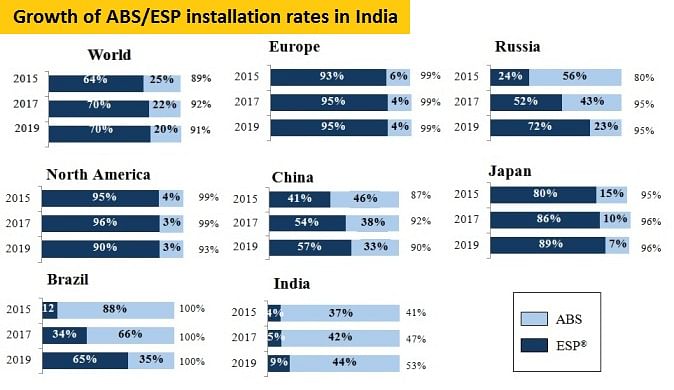
To reduce the high rate of road accidents in the country, he said that the growth rate of ABS/ESP installation needs to be speedily accelerated. He revealed the fact that the overall installation rate of ABS/ESP is poor in India (41% in 2015) compared to Brazil (100%), North America (99%), Europe (99%), Japan (95%), China (87%) and Russia (80%).
Bosch Chassis Systems India’s plant in Chakan, Pune, manufactures ABS (Generation 08 and now 09 family of actuation system) and ESP. The plant, which is India’s first ABS/ESP manufacturing facility, currently produces close to a million active safety units per annum and catering to most OEMs in India.
The ARAI way of making Indian roads safer
The Automotive Research Association of India’s (ARAI) A V Mannikar, senior deputy director and head (Passive Safety and Safety & Homologation Labs), stressed the importance of making road safety a national movement.
Starting with the role of a regulatory framework in road safety, Mannikar highlighted that despite having 116 safety regulations in place, India leads the list of road accident deaths because of the lack of proper implementation and monitoring.
In this regard, he pointed a list of stronger implementation of existing regulations such as mandatory seatbelt and helmet use, regulation of heavy motor vehicles and the imposition of harsh penalties for drunk driving and overspeeding, to name a few.
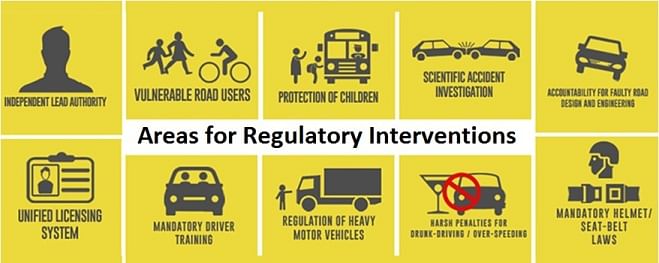
Talking about the need to avoid accidents altogether by the implementation of more active safety technology features in Indian cars, he said that introduction of technologies like ABS and driver assist radars could go a long way in reducing the number of accidents. While these technologies are common in new cars sold in developed markets like Europe, manufacturers are yet to implement these safety features in India.
Chalking out the safety roadmap for India, Mannikar stressed on the need to align with the recently announced UN ECE regulations and adoption of common crash standards for passenger cars, including testing for frontal and side impact for occupant safety.
He also impressed upon the need to start working towards highly neglected facets like child and pedestrian safety in India and suggested that all Indian cars should come with mandatory provisions for installation of child restraint systems. He said that the B-NCAP (Bharat New Car Assessment Program), set to be implemented by 2017, will be framed keeping all these aspects of road safety in mind. According to Mannikar, B-NCAP would not only promote consumer information about safe cars but would also incentivise the OEMs to launch safer vehicles in the market.
The first phase of B-NCAP will consist of offset frontal, side impact, pedestrian impact tests in addition with points for safety features such as head restraints for all seats, ABS, ESC (electronic safety control) and ISOFIX.
While concluding he identified the five pillars of road safety in India and the need to improve on enforcement, consumer awareness and self-discipline to fetch benefits of regulations and technologies to make Indian roads a safer place to be at.
M&M bats for safety of pedestrians, cyclists and two-wheelers
Vidyakant Revankar, senior principal engineer (Safety Systems), Mahindra & Mahindra, spoke on the role of technology in automotive safety. Providing global and Indian statistics on road accidents, the majority of fatalities included car occupants in Europe, America and Africa. However, in South-East Asia and Western Pacific, two- and three-wheelers contributed to the majority of road fatalities.
“South East Asia accident stats are skewed towards motorbikes, cyclists and pedestrians. Moreover, car occupant-related accidents make up 15% of the total and are comparatively the least among all other geographical regions. In fact, India and Sri Lanka data shows the urgency to address pedestrian, cyclists and motorbikes,” explained Revankar.
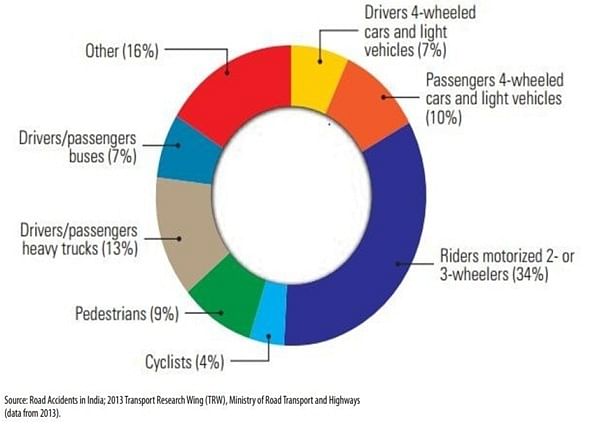
The data also highlighted the negligence towards child safety with 57 middle income countries having no regulations on child safety. Injuries to infants also contribute to a higher loss to GDP given a longer less productive life.
As per Revankar, road safety is based on five factors:
- Driver factors: This includes the skills and vision of the driver, his/her speed, age and distraction.
- Vehicle design factors: Vehicle design is mainly based on the type of fleet, technology and the maximum speed.
- Pedestrian factors: If a child or a senior citizen is crossing the road, it makes a huge difference. Further, if a person is disabled, intoxicated or simply distracted adds to the scenario.
- Ecosystem factors: There are several factors such as the design/ condition of the road, the weather, functioning of signals, lighting in the surrounding or weather that may have an effect on the accident.
- Social & political factors: Each region has different traffic laws and in turn law enforcement issues. Moreover, the travel styles of different regions and the demographic spread also tend to play a hand in the road safety scenario.
SaveLife Foundation calls for national road safety law
The SaveLife Foundation, an NGO committed to improve road safety and emergency care across India, also made an impact. Calling for a comprehensive, inclusive national road safety law, Saji Cherian, director (Operations) detailed some hoary statistics: 1.2 million people have died in road accidents in India over the past decade; this includes over 300,000 two-wheeler riders, 120,000 pedestrians and over 600,000 vulnerable road users like the elderly and children. Road accidents have in the past decade serious injured or disabled 5 million people in India, and 20 children below 14 years old are killed every day in India due to road accidents. The annual GDP loss to India due to these accidents is 3%.
Cherian called for a speedy and stringent update on road safety laws, which were last updated in the year 2001 and by which 50 percent of existing road users are excluded.
Detailing the factors behind road traffic accidents in India, he pointed out the fractured driver licensing system, weak penalty system and minimal use of technology, flawed design of road engineering, and the abject lack of trauma care facilities. He pointed out that at least 70,000 people can be saved with timely emergency care. It may be recollected that the SaveLife Foundation was instrumental in getting the Good Samaritan law notified by the Central and State governments recently. Through its ADAPT program, the NGO has been training high-risk drivers (like long-haul truckers) in techniques required to anticipate and prevent road accidents. It is also assisting and implementing the Mumbai-Pune Expressway Zero fatality Corridor initiative.
RELATED ARTICLES
Bajaj Auto launches new Chetak 3503 at Rs 110,000
The Chetak 3503, with a claimed range of 155km, 63kph top speed and a slower charging time than its 35 Series siblings, ...
Hyundai walks the eco talk with biogas plant, material recovery plant in Gurugram
Operational since October 2022, the facility targets sustainable waste management in Gurugram by undertaking scientific ...
Rajiv Bajaj reappointed MD and CEO of Bajaj Auto for five-year term
Bajaj Auto’s Board of Directors has approved the re-appointment of Rajiv Bajaj as the company’s MD and CEO for another f...






 By Autocar Professional Bureau
By Autocar Professional Bureau
 04 May 2016
04 May 2016
 11170 Views
11170 Views









